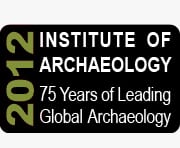The Social Impact of Climate Change: An Archaeologist’s Perspective
By news editor, on 6 February 2012
Review of Professor Arlene Rosen‘s Inaugural Lecture on 30 January by Dr Andrew Garrard (UCL Institute of Archaeology).
 With increasing concern about global warming and climate change and its impact on future human generations, Arlene Rosen’s inaugural lecture as Professor of Environmental Archaeology was particularly pertinent.
With increasing concern about global warming and climate change and its impact on future human generations, Arlene Rosen’s inaugural lecture as Professor of Environmental Archaeology was particularly pertinent.
In this elegantly structured and very well illustrated presentation, she discussed an archaeologist’s perspective on the impact of climate change on societies at various stages in the past, and their frequent social and technological resilience and adaptability to environmental change.
Arlene undertook her training in environmental archaeology and social anthropology with three renowned scholars: Louis Binford at the University of New Mexico, Fekri Hassan at Washington State University and Karl Butzer at the University of Chicago.
She trained in the techniques of geo-archaeology and has been a leading figure in the development of phytolith analysis in the reconstruction of past climate, agricultural systems and diet.
She has undertaken field research in many parts of the world and has published widely, including two very significant monographs, Cities of Clay: The Geoarchaeology of Tells (1986) and Civilizing Climate: Social Responses to Climate Change in the Ancient Near East (2007).
In her lecture, she reflected on the history of interpretation of human responses to climate change, from the environmentally deterministic approaches particularly prevalent in earlier periods, to the more socially informed approaches that are more common today.
She employed the models of Resilience Theory, as developed initially by ecologists and more recently applied to archaeological data to examine the possible adaptive cycles involved in three case studies from the Near East, in which it has been argued that environmental change had a major impact on societies or their adaptive behaviour.
In her first example, she outlined the debate concerning the impact of the cold dry terminal Pleistocene “Younger Dryas” event on Natufian hunter-gatherer communities in the Levant.
Some have argued that this was a catalyst in the beginning of cereal cultivation, among groups that had become partly dependent on wild cereal harvesting and also become semi-sedentarised.
In her research on phytolith assemblages from Early and Late Natufian sites in this region, she agrees that the Younger Dryas probably did have an impact on the resources available, but that Late Natufian groups simply diversified to using a much broader spectrum of resources and showed great resilience to the changing conditions.
In a second example, she discussed the claims that a reduction in rainfall close to the end of the third millennium BC led to the collapse of Early Bronze Age society in the southern Levant.
She argued from the wide fluctuations in rainfall during the centuries prior to this episode that communities in many areas of the Near East had become adapted to “boom and bust” uncertainty through technological innovation, but also through social mechanisms supported by religious ideology.
However, it seems likely that a breakdown in the complex interplay of these mechanisms did fail in the south-western Levant at the end of the third millennium, leading to a population crash and a switch from urban lifestyle to small-scale agro-pastoral village or nomadic life.
In her final example, she looked at the circumstances surrounding the abandonment of Byzantine towns in the arid setting of the Negev Desert in southern Israel, which some have argued could relate to increasing desiccation.
However, there is evidence that these towns were established in a period as dry as today, although with probably lower interannual variation in rainfall.
These communities, which had adapted to the environments using highly innovative techniques of rainfall run-off capture, managed to produce cereals and enough wine and olive oil for themselves and for export. The abandonment of these settlements seems more likely to relate to political events rather than the impact of climate change.
Through these examples, selected from the long-term record of human-environment relations in the ancient Near East, Arlene showed the capacity for resilience and sustainability among a number of these societies, which is of potential relevance to present day communities in their response to global warming and climate change.
Andrew Garrard is Senior Lecturer in Palaeolithic and Mesolithic Archaeology at the UCL Institute of Archaeology with research interests including the adaptations of Neanderthal and early modern human societies, the beginnings of agriculture and pastoralism and the reconstruction of past environments, subsistence and site formation processes.
Prof Rosen’s lecture is one of a series of 75th anniversary inaugural lectures being held in 2012 to mark the Institute’s 75 years leading global archaeology. Further details of all anniversary events are available on the Institute’s dedicated 75th anniversary webpages
 Close
Close

